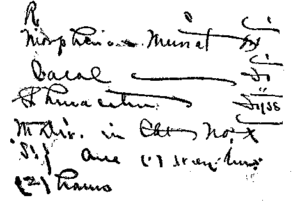If You Didn’t Document It, It Didn’t Happen
We’ve all heard the line before, “If you didn’t document it, it didn’t happen.” This phrase is often used in medical training as a method to strive for better documentation. Though there is some truth to this phrase, some residents and physicians have taken it a bit too literal. The phrase in some aspects has morphed into a way to encourage doctors to cover their tail. This is a bit of wishful thinking. No amount of documentation can completely protect a physician from a lawsuit. Instead of being worried about covering your tail to avoid lawsuits, the phrase I think more realistically should be “If you didn’t document it, you’re not getting paid.”
There Are 3 Main Reasons To Strive For Excellent Documentation
- Communicate to other providers what you are thinking in a concise and professional manner
- Possess a legal document that can back up your statements in a court of law
- And of course, providing a document of service that can later be billed for

Lake Travis. Austin, TX.
Communicating To Other Providers
The most frequent reason I encourage proper documentation to new, training physicians is to communicate the treatment plan to other providers regarding your patient. Billing comes in second for two reasons. First, patient care is always priority. Second, procedure-focused specialties such as surgeons may not bill for notes written. I’m sure we have all seem examples of brief notes before. Here is an example of a surgeons note for a patient on my service that I’m following along for medical issues:
78 yo F POD #1 right THA
- doing well
- pt/ot
- dvt ppx
- rehab when accepted
- med management per IM
Short and to the point because the bill the surgeon receives is for the surgery, not for subsequent notes. The main purpose for a large number of notes in the chart is to communicate to other providers while having a legal records of these communications.
If You Didn’t Document It, You Are Not Getting Paid
The days when physicians would write hand-written illegible notes are for the most part thankfully gone. Long ago, physicians were potentially able to bill for these notes, but those days are a distant memory. If a note is not legible or documented correctly, the physician risks having that bill denied by insurance companies.

Even worse. If there is no proof of documented service, this could be considered at minimum improper documentation or worse case – fraud. The government by extension of medicare gives a time frame on how long a physician has to place a document in the chart. Waiting too long to provide documentation in a chart could be as bad as never placing any documentation at all.
Medical Legal
Disclaimer:I am not a lawyer and definitely not your lawyer.
I’ve gone through several court proceedings with my family’s business before and basic traffic tickets that I have challenged. To date, I have luckily not been involved in a medical legal case.
In each of these cases, the typical legal procedures are followed. Documentation was provided to help support both sides of the argument by representing lawyers. These documents are scrutinized and the weight of them is argued in court. A judge or jury will decide who will end up winning the case based on many aspects of what is presented, one of which is documentation.
To say “something was not documented so it must not have happened” is a bit of a hyperbole. I’m in no way advocating for improper documentation. However, it’s not realistic to document every aspect of a case.
If my patient gets Clostridium difficile colitis, am I putting myself at risk because I didn’t document every day that I preformed proper hand washing technique prior to entering and leaving the room? Of course not.
I inform my residents that I would much rather them place mental effort into proper documentation. This especially is true when making large decisions. For example, a surgeon may write a detailed note why surgery is not being offered with an explanation behind their choices.
Proper Documentation Can Make You Extra Money
Many physicians have coders that are hired to ensure that what is billed by the physician matches up with documentation provided. These coders may even scourer the note for additional billable services. Medical coders may potentially find areas to increase revenue that the physician may have overlooked.
When I started working, our coders informed me that I could bill for excess time spent with patients, EKG’s, advanced care planning, and tobacco cessation counseling that I was properly documenting, but not billing for. I have no problem being paid for a service that I properly back up with documentation.





Part of the reason Epic Medical Records have been so successful is that it is basically a billing software with documentation on the back end. The purpose of the system was to maximize billing. Nice post and thanks for sharing.
I miss how Epic has billing integrated in its software. There were some things I absolutely loved about the EMR but the down time of Epic at my previous hospital definitely took away from all the positives.
Pingback: Legal Action – Step Up Women's Network